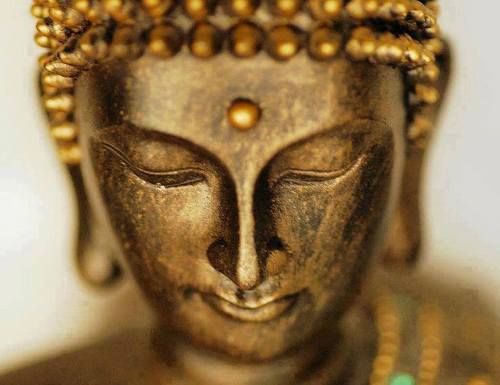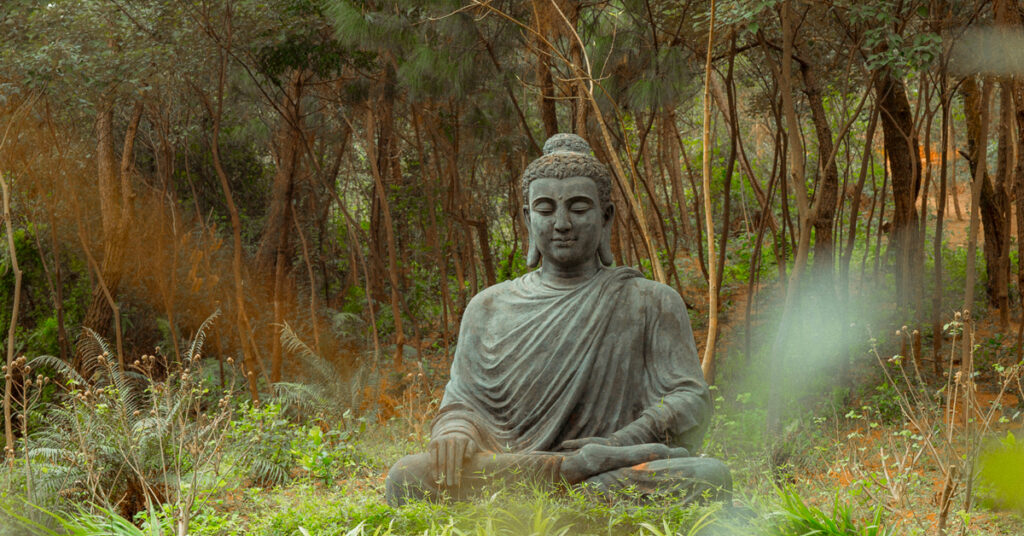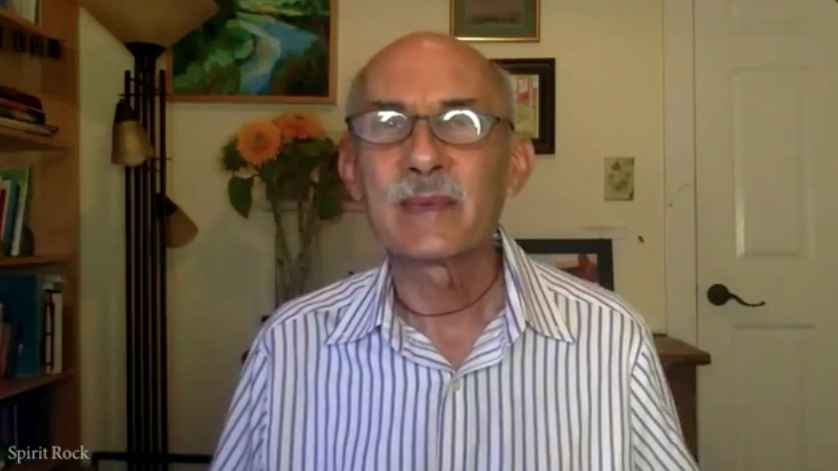by Diane Williams
When the path ahead is unknown and may even appear menacing, how do we move forward with courage? Is it possible not to react with anger, frustration and sadness when our hopes and dreams fail to materialize? It is not only possible but it is within reach of all us when we awaken to the wisdom within ourselves, says Jack Kornfield, an influential teacher noted for introducing Buddhist mindfulness practices to the West.
One of the first steps we can take, whether we are seeking physical or emotional healing, says Kornfield, is to hold ourselves with compassion and love. “Just as yeast is a necessary ingredient for bread to rise, compassion and love are the necessary ingredients for healing. Without compassion, the heart doesn’t open or heal. In our culture we tend to be taught to fight against difficulties and against ourselves in ways that are not always healthy. So if we’re sick or having a hard time in our life, not only do we fight against the circumstances, but we judge and blame ourselves and fight against the fact that we’re anxious or depressed. Making war against what is in us keeps it locked in. When we bring compassion to the struggles we have it melts the shell of our heart; it allows that difficulty to be held in a new way and connects us in a new way to all our feelings and out of that comes healing and acceptance. It allows us to transform the circumstances and allow well-being.”
In Kornfield’s new book and CD set from Sounds True, A Lamp in the Darkness: Illuminating the Path through Difficult Times, he offers practical ways to tap into our inner wisdom, which he refers to as “The One Who Knows.” “When we look in the mirror and notice that we’ve aged, very often there arises the thought, ‘I don’t feel as old as I look.’ Or we have the thought, ‘My body is aging.’ In that moment we become the witness to our body as it progresses through life. That thought is coming from The One Who Knows. The One Who Knows recognizes us as a child, a teen, a young adult, an aging adult.
“There is a natural awareness that is always conscious; this is our spirit that is not limited by our changing circumstances in life. This consciousness can reflect on our experiences and is present to life but not lost in our circumstances or story. The One Who Knows also carries consciousness for us. Deep in our heart we know what is right, what is wrong, what it means to be loving and respectful of ourselves and others. Even if we don’t follow it, the One Who Knows carries this wisdom and knowledge for us and it is always available to us – it is the Buddha nature that carries this seed of awakening for everyone.”
Reawakening Our Love and Compassion
Kornfield believes the qualities of love and compassion are natural and innate to us; they are part of The One Who Knows, of the wisdom we carry. “Love, compassion, forgiveness – all of these things grow when we learn how to practice them,” says Kornfield. A Lamp in the Darkness is not the presentation of ideas or philosophies, but rather offers meditations for cultivating and reawakening our innate love and compassion.
“The book shows us how to approach our problems and bring attention, compassion and forgiveness to ourselves and others,” he notes. Most of the meditations are drawn from classical eastern psychology and Buddhist teachings learned when Kornfield was training as a monk in Thailand, Burma and India. Others were developed for our western practice and western time. In addition to his Buddhist training, Kornfield holds a Ph.D. in psychology. “It’s 35 years of teaching and learning what language and what images are most helpful to people in the west,” says Kornfield.
“One of the beautiful things that we find from Buddhist and other eastern philosophies – and now modern neural science research is showing – is that compassion can be trained,” Kornfield remarks. “It is natural to us but there are also beautiful practices to reawaken our compassion. Through systematic practice we can reawaken our compassion.
“And in doing so, we also change our body. Modern science shows us that through compassion and kind attention our immune system response is boosted and the telomeres (molecular structures on the tips of chromosomes) that extend our life and well-being are protected in ways that lengthen our life. More blood flow goes to the areas that we put kind attention on and that can improve our physical well-being.”
What we may think of as annoyances in our everyday lives can actually be the catalysts to reawaken our compassionate nature, Kornfield says. “If you have a child who is hurt and you are busy, you may be annoyed when they interrupt you. You may want to push away and ignore the child in that moment. But if you stop and kneel down and pay attention to the child in that moment, notice what is happening in their body, notice their fear or hurt, quite naturally your compassion opens. The child feels this and realizes they are supported, that they will be fine. In the same way, the power of mindfulness is a non-judging, open, honest attention to see what is true. When we see what is true, when we look at a tough challenge with mindfulness, with present attention in an open-minded way, we connect with it and that connection is the current of compassion and love. Whether it’s a tree or a garden or the world around us, we connect.”
Befriending our Darker Emotions
Kornfield recognizes that as a culture, we in the West often resist meditation because it can mean facing our darker emotions, such as anger, shame and guilt. “In the West we haven’t been taught how to be comfortable with darker emotions and they scare us. We don’t know that when we run away from something, it follows us. So, we have created the enemy du jour. For a while it was the Communists, and then the Muslims or the immigrants. We have a history of looking for the source of our problems outside ourselves and then being frightened of them. It’s really based on misunderstanding and ignorance. When we turn toward that which is difficult, it brings dignity and courage and teaches us to live a wise, compassionate life. Our very difficulties become the places where our heart grows compassionate and wise. Every being on Earth will have a measure of difficulties in life. When we are taught not to be afraid of joy and sorrow, gain and loss, birth and death, we become free.”
Once we have befriended the dark emotion of anger, we can move into forgiveness, says Kornfield, another concept that we in the western world seem to be struggling with in these times. “Without forgiveness, we are chained to the past,” Kornfield says. “The Irish Catholics and Irish Protestants fight each other because their grandparents did, the Israelis and Palestinians, the Hatfields and McCoys, and we do the same in ourselves if there is no forgiveness – we perpetuate the suffering.
“Forgiveness doesn’t mean we condone the past,” says Kornfield, “it means we know how to let go of the hate, bitterness and judgment and say, ‘I can start anew.’ To have a forgiving heart is for ourselves and the mistakes we’ve made. To forgive ourselves is a tremendous act of renewal and kindness we can give ourselves so we can begin our lives today. Many of the practices in A Lamp in the Darkness are designed to teach people how to forgive themselves and others.”
Kornfield believes that the practice of forgiveness not only makes our life better, but it can also change the world around us. “If we as a human species could learn how to forgive it would make an enormous change in our life and in the world,” he says. “People are confused because they think it makes them weak to forgive but there is nothing that can transform the world more fundamentally than compassion for themselves and the world. No amount of technology can stop war, racism and environmental destruction. We are called to transform our relationships in the way our heart knows to be true – with compassion and caring.”
Awakening to our connection with each other
When we awaken to our inner wisdom, notes Kornfield, we awaken to the truth that we are all connected. “Oneness is not a belief, it is reality. We know that we are physically interconnected. The air we breathe is circulated from the trees around us, the salt water in our blood stream comes from the clouds and rivers that rise out of the ocean; we are physically part of the cycling of the elements. In the same way, our physical beings are also connected. We wouldn’t survive without others. To imagine that we are somehow separate and free of dependence on others is one of the illnesses of modern times, one of the greatest causes of suffering. That brings environmental desecration, loneliness and isolation. The reality is we are connected in body, heart and spirit.”
He shared this example from his own life to illustrate how we are all connected in spirit. “My wife and I were living in a temple in the mountains of India many years ago and she had a vision in a meditation of a family member dying. I tried to reassure her just to be kind with the vision. Ten days later we received a telegram that her brother had died. The telegram was dated the same day she had her vision and he had died in the way she saw in her vision. There is as much a weaving of conscious that connects us as there is of the waters that connect us. The very practices of shared compassion are ways to access directly this interconnection with all of life.”
The Power of Intention
Kornfield believes that one of the most powerful trainings that can come to us is accessing the highest intention in ourselves. There are ways to access this wisdom, he says. “When we get into a confrontation with another person or when we have difficulties in ourselves, if we stop, center ourselves and ask our heart, ‘What is my best intention in this interaction?’ our inner wisdom – The One Who Knows – answers us. Knowing this intention changes everything.
“If you are in an argument and take a breath and ask your heart, ‘What is my best intention . . . to solve this? To come to a place of love and understanding?’ Once you have accessed your highest intention, your whole tone of voice will change. That same ability to access your true intention can open your life in beautiful ways. Accessing intention can direct what unfolds. We can’t always choose what happens to us, but we can always choose our spirit in any given circumstance. And that spirit can have compassion, love and freedom no matter what the circumstance. That’s the healing message of A Lamp in the Darkness.”





